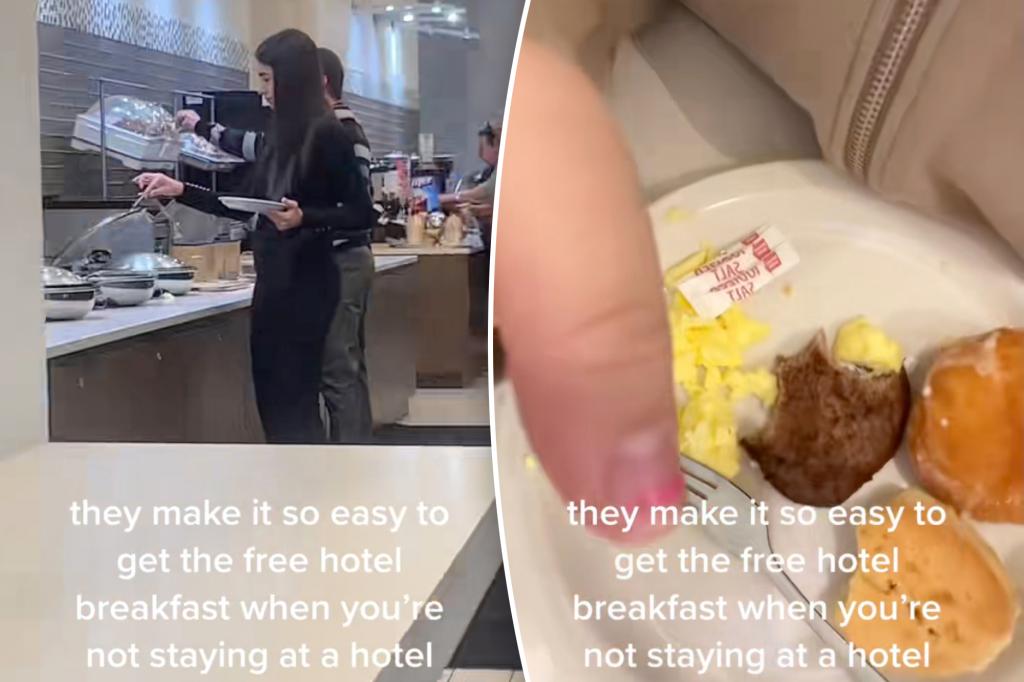The Breakfast Club: How People Are Sneaking Free Hotel Meals
In a trend that’s as bold as it is resourceful, more people are reportedly walking into hotels and helping themselves to complimentary breakfast buffets without ever booking a room. These “cereal” thieves, as they’ve been dubbed, have created a subculture of freeloading that’s now spreading across social media platforms and raising eyebrows in the hospitality industry. Reddit threads are filled with detailed instructions on how to blend in with legitimate guests, while TikTok videos showcase successful breakfast heists garnering millions of views. The practice, while technically theft, has become something of a minor rebellion against overpriced dining options, with practitioners developing increasingly sophisticated strategies to avoid detection. “Enter any mid-class hotel right around breakfast time when the lobby is empty,” advised one Reddit user, suggesting visitors first spend time in the bathroom before casually approaching the breakfast area as if they belong there.
Social media has turned this petty crime into something of a performance art. TikTokker Sophia Masso’s video showing herself enjoying eggs, sausage, and other breakfast items at an unnamed hotel has garnered over 5 million views. The comments section of such videos often functions as a masterclass in breakfast banditry, with experienced practitioners offering tips like “as long as you don’t look homeless you’ll be ok” and “if questioned by anyone, say you’re waiting on your spouse to come down.” Others warn against targeting upscale establishments, noting that “nice places are much more apt to catch you or have protocols in place,” while suggesting that “common hotels with bland generic breakfast are a dime a dozen and super easy to walk into.” One commenter even described jogging into hotels as if returning from a morning run, eating breakfast, and walking out without raising suspicion—turning the heist into something resembling a workout routine with benefits.
The practice has become so widespread that even travel industry insiders have acknowledged how easily these systems can be exploited. Gary Leff, a contributor to the travel blog View From The Wing, admitted to noticing how vulnerable hotels are to breakfast crashers. He described staying at an Aloft hotel but eating breakfast at the connected Element hotel next door, where “no one checked that I was a guest or eligible for breakfast.” While Leff didn’t actually exploit this loophole himself, he noted how simple it would have been to do so. He did, however, question whether most hotel breakfasts are worth the moral compromise, stating that “most limited-service breakfasts aren’t going to be so good that you’d show up for it if you aren’t already on premises.” Yet in the same breath, he empathized with those who might justify the theft like “hero Jean Valjean steals the bread in Les Miserables”—a surprisingly literary reference for what amounts to stealing scrambled eggs and mini muffins.
What makes this trend particularly interesting is the development of an unspoken etiquette among these breakfast bandits. Veterans of the practice often advise newcomers to be respectful, take only what they need, and avoid creating disruptions that might lead hotels to implement stricter verification measures. There’s an understanding that the sustainability of this loophole depends on discretion and moderation. Some justify their actions by pointing to the significant food waste in hotel buffets, suggesting they’re actually performing an environmental service by consuming what might otherwise be thrown away. Others cite economic necessity, particularly during times of inflation and rising food costs. The practice seems to flourish in that gray area of ethics where the victim—typically a large hotel chain—is perceived as being able to absorb the loss without significant harm, while the perpetrator gains something they genuinely need.
The hotels themselves seem surprisingly uninterested in cracking down on the practice. While the cumulative cost of stolen breakfasts must be substantial, the expense of implementing verification systems—whether through staff checking room keys or more sophisticated technological solutions—apparently outweighs the losses. Many hotels operate on slim margins and have reduced staff since the pandemic, making it difficult to police breakfast areas effectively. Some industry observers suggest that hotels actually build a certain amount of theft into their business models, considering it part of the cost of operation. There’s also the customer experience to consider—legitimate guests might be annoyed by having to prove their status every morning. This creates a perfect environment for breakfast opportunists, who understand that in the hospitality world, appearances matter more than verification.
However, before you grab your plate and join the breakfast brigade, consider a former hotel employee’s warning about the quality of these free meals. Brandi Augustus, a 15-year veteran of the hospitality industry, revealed some unsettling practices she witnessed during her career. According to Augustus, staff at lower-tier hotels often handled food without washing hands or wearing gloves, baked goods were recycled for days, and waffle makers contained batter that had been reused so many times it actually fermented. These revelations suggest that the “free” breakfast might come with hidden costs to your health. The breakfast bandits may be getting away with theft, but the real question becomes whether what they’re stealing is actually worth having. As hotel breakfast enthusiasts—both paying and non-paying—continue to debate the morality, techniques, and quality of these morning meals, one thing remains certain: tomorrow morning, someone somewhere will confidently walk into a hotel they’re not staying at, fill a plate with scrambled eggs and mini muffins, and walk out feeling like they’ve beaten the system—one breakfast at a time.


